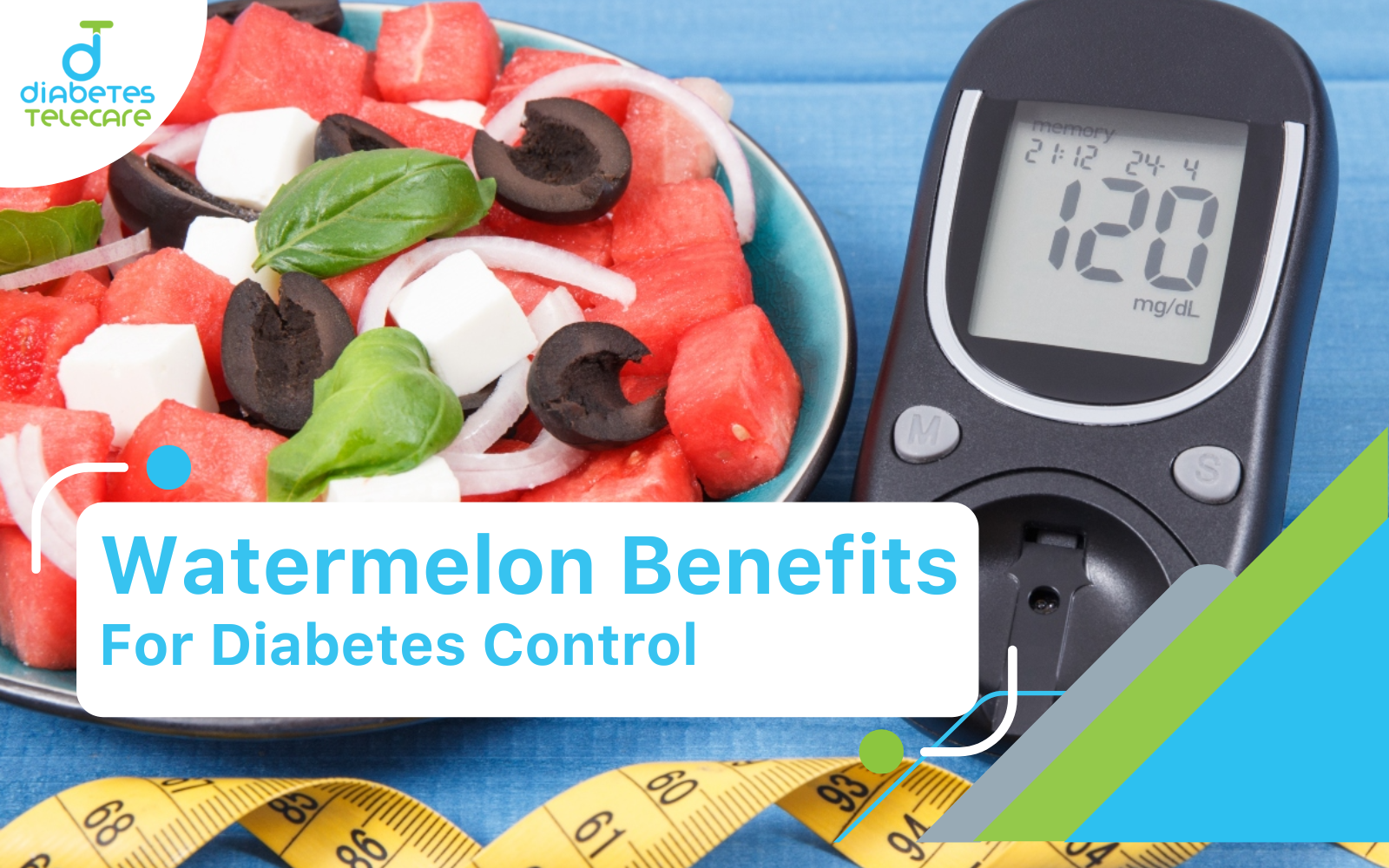
-
Posted By Diabetes TeleCare
-
-
Comments 0
Flavorful and hydrating, watermelon for diabetes is a natural product that is great for some things, including individuals with diabetes. We’ll examine the ten benefits of watermelon for diabetes in this blog and sort out the amount to eat.
How much sugar is in watermelon?
Your glucose levels might be affected by the normal sugar tracked down in watermelon. The amount of watermelon you eat determines how much sugar is in it.
Diced watermelon weighs 152 grams (g) or one cup. Of that weight, 9.42 g is normal sugar and 11.5 g is carbohydrate.
A solitary wedge, or 286 g, or roughly one-6th of a watermelon, has 17.7 g of regular sugar and 21.6 g of carbs.
If you have diabetes, a little serving of watermelon may be a healthy addition to a well-balanced diet.
Recommended Amount of watermelon for diabetes
While watermelon has many advantages, control is key because of its regular sugar content. For diabetes patients, it is prescribed to consume:
- Serving Size: 1 cup (around 150 grams) of diced watermelon per serving.
- Frequency: It tends to be securely included as a part of a balanced diet a couple of times each week.
The benefits of watermelon for health
In addition to fiber, watermelon contains the following vitamins and minerals:
- vitamin A
- vitamin C
- potassium
- magnesium
- vitamin B6
- iron
- calcium
10 Benefits of Watermelon for Diabetes Management
1. Hydration
Watermelon is about 90% water, and, therefore, very good for hydration. Proper hydration is important for good health, and maintaining optimal physiological processes, which is also very important in the management of diabetes.
2. Low-Calorie Content
Watermelon is a great food choice for people who are trying to maintain or reduce their weight due to its low-calorie content. The executives additionally structure a significant piece of diabetes control, and low-calorie food varieties are useful in this.
3. Rich in Vitamins and Minerals
Watermelon contains a long list of important vitamins and minerals, including Vitamin A, C, B6 as well as potassium and magnesium, to name just a few. These supplements have essential uses for the improvement of good skin, insusceptible well-being and general prosperity.
4. Contains Antioxidants
Rich in antioxidants lycopene and beta-carotene, watermelon helps protect the body from oxidative stress and inflammation. Heart Health — The antioxidants in cocoa powder can help lower (bad)Essentially, antioxidants are compounds that neutralize free radicals.
5. Supports Heart Health
Lycopene is a color in watermelon that gives it its tone, and it additionally has a moderate amount of this cell reinforcement. Also, lycopene is an intense cancer prevention agent! Lycopene might play a role in lowering your risk of cardiovascular disease. This is beneficial for people who have diabetes type 1 and 2 because they are at high risk of developing heart disease.
6. Fiber Content
Watermelon isn’t extremely high in fiber, but does provide a small amount which can encourage digestion and help maintain good bowel health. Fiber also helps in the retention of sugars, which can be useful for glucose control.
7. Promotes Kidney Health
The high water content and diuretic properties of watermelon are best for flushing out toxins and assisting kidney function. Diabetes patients should have requisite Kidney function to be able to prevent just like nephropathy.
8. Helps Control Appetite
We all love the sweet taste of Watermelon, this natural sweetness along with its high water content, can keep you satisfied from sweet cravings and promote a sense of fullness to restrain the overeating tendencies hence helps in weight management eventually.
9. May Improve Insulin Sensitivity
A couple of studies suggest that the amino destructive citrulline, found in watermelon, may additionally develop insulin responsiveness. Better insulin responsiveness can help with managing blood sugar levels more effectively.
10. Boosts Energy
Watermelon contains vitamin B6, which is important for energy production. This can assist diabetes patients with staying aware of their energy throughout the day.
Conclusion
Watermelon for diabetes is safe to eat with some restraint. However, it is best to eat watermelon and other high-GI fruits that contain a lot of nutritious fats, fiber, and protein.
In spite of the fact that watermelon is high on the GI scale, it has a low glycemic load, and that implies it will meaningfully affect an individual’s glucose levels after utilization. For personalized care and deeper insights into managing diabetes, consider booking an appointment with our specialist. Your health deserves the best attention.
For Contact: +92 323 3004420
Recent News
- Are Carrots Good for Diabetes? Benefits and Glycemic Impact
- Bananas and Diabetes – Can Diabetics Eat Bananas? Find out here
- Managing Diabetes with Broccoli: Health Benefits and Tips
- How a Low Carb Diet Helps Diabetics Control Blood Sugar
- Is Sweet Potato Good for Diabetes? How They Affect Blood Sugar



